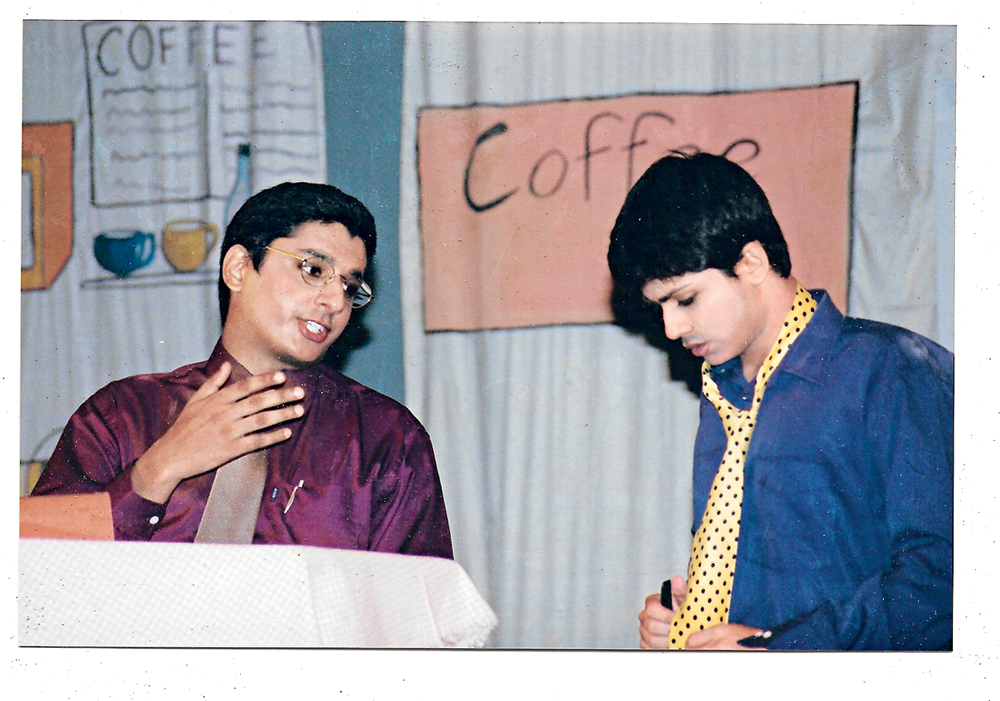Fear is an irrational thing, it must yield to reason.”
This is what the Logician, a character in Eugene Ionesco’s Rhinoceros, a play scripted in 1959, had reasoned.
On this day — World Theatre Day — observed on March 27, first initiated in 1961, by the International Theatre Institute, I am exercising a liberty that puritans might condemn. It’s a humble attempt at examining irrational fear psychosis and relating the same to the findings in the post-war avant-garde three-act drama.
I thought of revisiting The Red Curtain’s 2004 production of Ionesco’s absurd classic where we find the inhabitants of a small provincial French town turn into rhinoceroses, except the central character, Berenger.
The play was directed by Shuktara Lal. The drama therapist marked her directorial debut with this play and she set it in Calcutta. When quizzed if she found similarity between the play and the current coronavirus outbreak, she says, “In terms of the darkly comic range of responses of people to the crises, yes, especially Acts 1 & 2.” Shuktara elaborates stating “Act 1 is a hilarious depiction of residents in a city, gathering in a public space, all of them taking themselves extremely seriously.” Then the thespian draws a parallel to the collective human behaviour, by and large on social media, explaining, “Ionesco spins together a panoply of characters who intellectualise, gossip, lose their pets out of sheer silliness, bicker over trivialities, are distracted briefly by the appearance of a rhinoceros, and then snap back to exactly at what they had been doing.”
Rhinoceros was a play that many believed was autobiographical in nature. Ionesco reflected his own thoughts about the prevailing political scenario that he was exposed to. Advertising professional, actor, director, and a co-founder at Theatrecian, Dhruv Mookerji is of the opinion that “in context of the Covid-19, the equivalence should not be drawn with the disease itself, but with the way people react to it.” Dhruv performed the part of Jean, which in Shuktara’s Indianised version, was named Jeet. He, however, agrees that the “disease in both Rhinoceros and in Covid-19 is a straightforward beast with a given set of expected outcomes. But the uncontrollable beast is the human reaction, panic, theorisation, loggerheads and melodrama that are associated with it.”
It’s interesting to note that Ionesco made a statement on herd mentality with this play. Martin Eslin in his works quotes Ionesco: “People allow themselves suddenly to be invaded by a new religion, a doctrine, a fanaticism...”. However, Dhruv justifies that in the current scenario, there is a great need to follow the herd, and just lock down, sit tight and wait it out. Thus in a way Rhinoceros serves as a moral lesson — you could be something better than human. In the play it’s a rhinoceros, and in life today it’s a wiser human. Both are equally alien concepts.

Tathagata Chowdhury Sourced by the correspondent
Advertising expert and co-founder of The Red Curtain, Sumit Lai Roy, is able to draw a parallel of the virus scare and the play. He says, “The panic that has set in is similar to the panic of the Rhinoceros.”
Prithviraj Choudhury essayed the part of the protagonist, Berenger. In Shuktara’s adaptation, the character was named Akash. Prithviraj is another founder of Theatrecian, an actor in this production and is now heading the marketing division of Saregama. He has an interesting take on the element of fear and attempts to rationalise fear instead of downright condemn it. He empathises, “Given the situation we face today with the burgeoning of the dreaded virus, one can see how fear is the primary driver among the people right now. It may be fear which is valid, and many times it’s fear induced by over-enthusiastic zealots, carried forward by WhatsApp messages.” He goes on to add that “Rhinoceros, decades back, spoke about the breakdown of formative relevant languages in terms of crises; we see this today, in many ways, as we take on the Covid-19.”
Consultant psychotherapist Alaokika Bharwani expresses that fear and anxiety are normal at this point. She stresses on the fact that, “What’s alarming is panic. Panic is highly contagious and can cause the anxiety to notch up way higher. And those with an underlying anxious nature, this panic can increase the intensity of their symptoms.” In Ionesco’s play both the characters, Jean and Berenger, react differently to panic. One gives in, the other resolves not to turn into a rhino. The play ends with Berenger saying “I am not capitulating.”
Will we capitulate to panic?
On World Theatre Day, a message is usually shared, on the theme of theatre and a culture of peace. Theatre has the power to make a difference. It has the power to instil a sense of responsibility. And theatre has the power to change. Let’s resolve to wake up collectively to the urgent changes needed. Nature has started to declare a war against humans. We need to wake up and smell the coffee. Theatre is a powerful medium that can help in the awakening. Let’s pledge to give theatre a chance.










